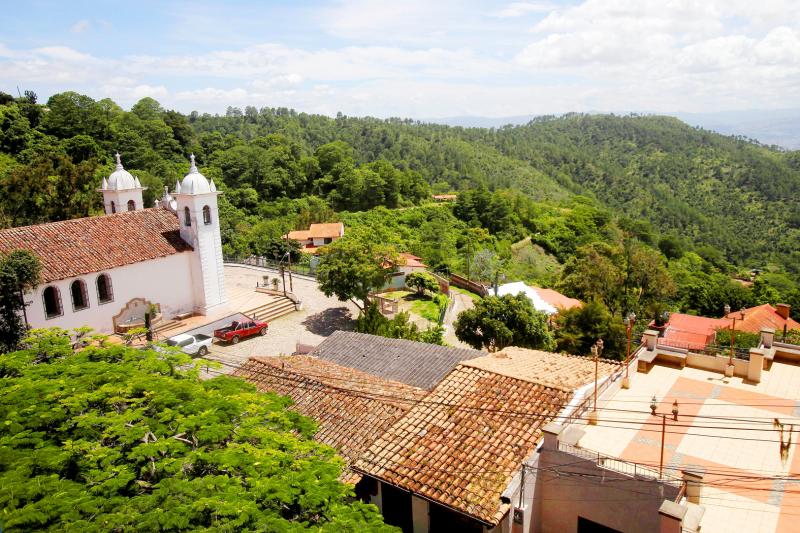People can pay for a slushie with cryptocurrency in the streets of “bitcoin valley,” a project in the Honduran tourist enclave of Santa Lucia, through which the country has entered the digital currency trend.
The small town in the mountains, 20 minutes from the capital, Tegucigalpa, has become a bitcoin city.
Owners of businesses big and small are adapting to handle cryptocurrencies as payment, hoping to attract more tourism.

Photo: Reuters
“It will open more opportunities and attract more people who want to use this currency,” said Cesar Andino, manager of the Los Robles shopping square.
The bitcoin valley project targets 60 businesses to initially get trained and adopt cryptocurrencies to market their products and services, expecting to spread these practices to more enterprises and nearby areas.
The initiative was jointly developed by the Blockchain Honduras organization, Guatemalan cryptocurrency exchange consortium Coincaex, the Technological University of Honduras and the Santa Lucia City Government.
“Santa Lucia’s community will be educated to use and manage cryptocurrencies, implementing them in different businesses in the region and generating cryptotourism,” said Ruben Carbajal Velazquez, a professor at the Technological University.
While some Latin American countries are exploring cryptocurrencies’ potential, there are risks.
In September last year, El Salvador adopted bitcoin as legal tender after introducing its own “bitcoin beach” in the surfing hot spot town of El Zonte.
The Central American country’s bet on bitcoin was hampered by a cryptomarket downturn, and skepticism from multilateral lenders and ratings agencies. Its publicly disclosed holdings of US$105 million are now worth about US$57 million.
To deal with volatility, the bitcoin valley project would “enable merchants to receive instant payments in the local currency, eliminating cryptocurrencies fluctuation risks,” Blockchain Honduras founder Leonardo Paguada said.
Critics of bitcoin’s expansion have warned that these kinds of operations might fuel money laundering and financial instability while enhancing the digital gap, as poorer residents might struggle to access the technology.

MULTIFACETED: A task force has analyzed possible scenarios and created responses to assist domestic industries in dealing with US tariffs, the economics minister said The Executive Yuan is tomorrow to announce countermeasures to US President Donald Trump’s planned reciprocal tariffs, although the details of the plan would not be made public until Monday next week, Minister of Economic Affairs J.W. Kuo (郭智輝) said yesterday. The Cabinet established an economic and trade task force in November last year to deal with US trade and tariff related issues, Kuo told reporters outside the legislature in Taipei. The task force has been analyzing and evaluating all kinds of scenarios to identify suitable responses and determine how best to assist domestic industries in managing the effects of Trump’s tariffs, he

TIGHT-LIPPED: UMC said it had no merger plans at the moment, after Nikkei Asia reported that the firm and GlobalFoundries were considering restarting merger talks United Microelectronics Corp (UMC, 聯電), the world’s No. 4 contract chipmaker, yesterday launched a new US$5 billion 12-inch chip factory in Singapore as part of its latest effort to diversify its manufacturing footprint amid growing geopolitical risks. The new factory, adjacent to UMC’s existing Singapore fab in the Pasir Res Wafer Fab Park, is scheduled to enter volume production next year, utilizing mature 22-nanometer and 28-nanometer process technologies, UMC said in a statement. The company plans to invest US$5 billion during the first phase of the new fab, which would have an installed capacity of 30,000 12-inch wafers per month, it said. The

‘SWASTICAR’: Tesla CEO Elon Musk’s close association with Donald Trump has prompted opponents to brand him a ‘Nazi’ and resulted in a dramatic drop in sales Demonstrators descended on Tesla Inc dealerships across the US, and in Europe and Canada on Saturday to protest company chief Elon Musk, who has amassed extraordinary power as a top adviser to US President Donald Trump. Waving signs with messages such as “Musk is stealing our money” and “Reclaim our country,” the protests largely took place peacefully following fiery episodes of vandalism on Tesla vehicles, dealerships and other facilities in recent weeks that US officials have denounced as terrorism. Hundreds rallied on Saturday outside the Tesla dealership in Manhattan. Some blasted Musk, the world’s richest man, while others demanded the shuttering of his

Taiwan’s official purchasing managers’ index (PMI) last month rose 0.2 percentage points to 54.2, in a second consecutive month of expansion, thanks to front-loading demand intended to avoid potential US tariff hikes, the Chung-Hua Institution for Economic Research (CIER, 中華經濟研究院) said yesterday. While short-term demand appeared robust, uncertainties rose due to US President Donald Trump’s unpredictable trade policy, CIER president Lien Hsien-ming (連賢明) told a news conference in Taipei. Taiwan’s economy this year would be characterized by high-level fluctuations and the volatility would be wilder than most expect, Lien said Demand for electronics, particularly semiconductors, continues to benefit from US technology giants’ effort